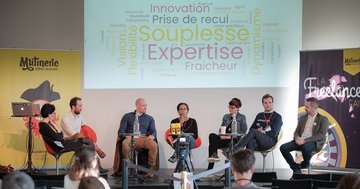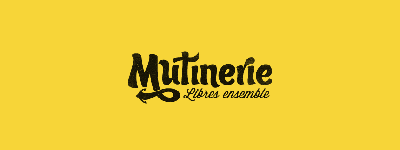Neither Precarious Workers nor Golden Boys, Freelance Fair Celebrates the New Breed of Freelancers

On March 16, the Bellevilloise opened its doors to 500 self-employed professionals as well as the simply curious of all types for the Freelance Fair.
Behind the scenes for this unprecedented event, the team from Mutinerie, a Parisian co-working space that is celebrating its fifth anniversary. Here’s an overview of the status quo of self-employed professionals with Mutinerie’s co-founder, Antoine Van den Broek.
Mutinerie is celebrating its fifth anniversary. Could you give us a typical profile of the self-employed professional you may come across at the space?
Contrary to common beliefs - people often imagine hyper-connected young graduates - they are actually people who already have 5 to 10 years of corporate experience, who have worked in major companies, advertising agencies or consulting firms... At one point in their career, for various reasons, they become freelance. Last year, we did a small survey among our coworkers: when we asked them what led them to become self-employed, half of them said "by choice", and the other half said because of "a combination of choice and necessity", but almost no one mentions only necessity.
These people also have a real taste for freedom, they are brave and proud. Because we mustn’t forget that being a freelancer is definitely not a piece of cake! Last point and not the least: they tend to do a job they love.

When speaking of self-employment, doesn’t the overall atmosphere seem focused on all the stress? Yet you are painting a completely different picture...
Please note that the freelancers I am describing only represent a share of self-employed professionals. Of course, there are still many “classic” independent workers (professionals, craftsmen...). But the new troops can be found among these definitely qualified freelancers, but also among new day-laborers who work on platforms.
Where’s the difference? Well, do you have rare skills, or not? Can you choose your clients? Do you own your working equipment? The emancipation of the workers largely depends on these criteria. More than being just about income - some drivers probably earn more than designers or independent journalists - the real issue is freedom. Some have the luxury of owning their job, while others see themselves more as interchangeable tools. In other words, some people choose to be self-employed, others are forced into it.
In my view, the movement toward more freelancing is unstoppable. First of all, because companies’ need for flexibility will increase. Also, because self-employment fits deeper aspirations: to find meaning in work, or a more harmonious work/life balance, for instance. Money is no longer the only measure of success. Lastly, simply because technological developments make it possible: today, we can work from anywhere, with people who are not necessarily in the same company. The problem is that the world of freelancers is a composite one. They do not have a culture of collective action. They still lack class consciousness!
Aren’t we starting to see some collectives form?
Of course, and co-working spaces have played an important role. Regrouping self-employed workers in the same place is already an important achievement! There are also collectives based on profession, between architects, IT developers... small groups pooling resources. On the other hand, when it comes to raising the stakes, in order, for instance, to weigh in on social dialogue, suddenly no-one is involved. Trade unions are beginning to do something about this issue. That is encouraging.
Is that what drove you to launch Freelance Fair?
Partially, yes. It is important to forge this collective identity, to engage the press and make our voices heard. Enough of the stereotypes: we are neither desperate precarious workers, nor the golden boys of the new economy! But this was also and above all an event with very hands-on contents: what legal form should you choose? How can you join an Activity and Employment Cooperative? This is important, because in the life of a freelancer, navigating through the maze of administrative constraints isn’t easy! Compared to other countries, France is not doing too badly, but there are still many uncertainties as to social protection as well as professional training, which is essential for this category of workers.

Credits: picture of Antoine Van Den Broek, picture of the Freelance Fair event

























